Stewardship
Stewardship
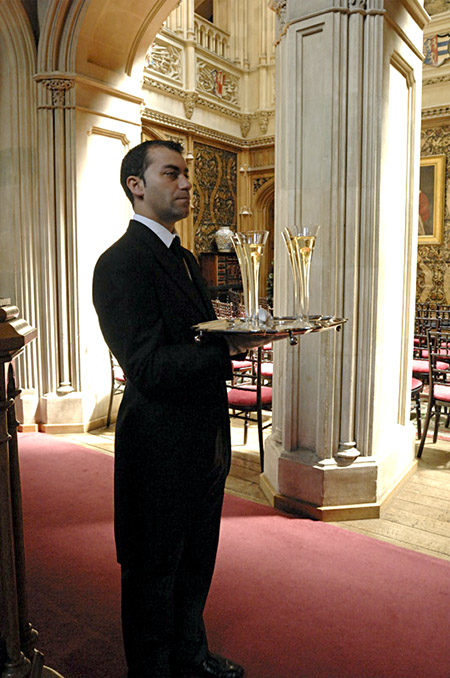 During the time of the 5th Earl and Countess of Carnarvon, which is the real era in which the fictional story of Downton Abbey began, guests may have been welcomed into the Castle by one of three people, depending on their importance and the time of day. The butler and the under butler are well known characters but there was also the House Steward.
The house steward was the most senior member of the household staff and employed by only the wealthiest of families. He, and it was always a man, was responsible for the smooth running of the household, engaging, dismissing and disciplining lower servants and controlling the main household accounts and was in many ways a hangover from medieval times. Effectively, they were the guardians of the house and the name and meaning goes back to the root of the word: “stig” meaning hall and “weard” meaning to protect.
During the time of the 5th Earl and Countess of Carnarvon, which is the real era in which the fictional story of Downton Abbey began, guests may have been welcomed into the Castle by one of three people, depending on their importance and the time of day. The butler and the under butler are well known characters but there was also the House Steward.
The house steward was the most senior member of the household staff and employed by only the wealthiest of families. He, and it was always a man, was responsible for the smooth running of the household, engaging, dismissing and disciplining lower servants and controlling the main household accounts and was in many ways a hangover from medieval times. Effectively, they were the guardians of the house and the name and meaning goes back to the root of the word: “stig” meaning hall and “weard” meaning to protect.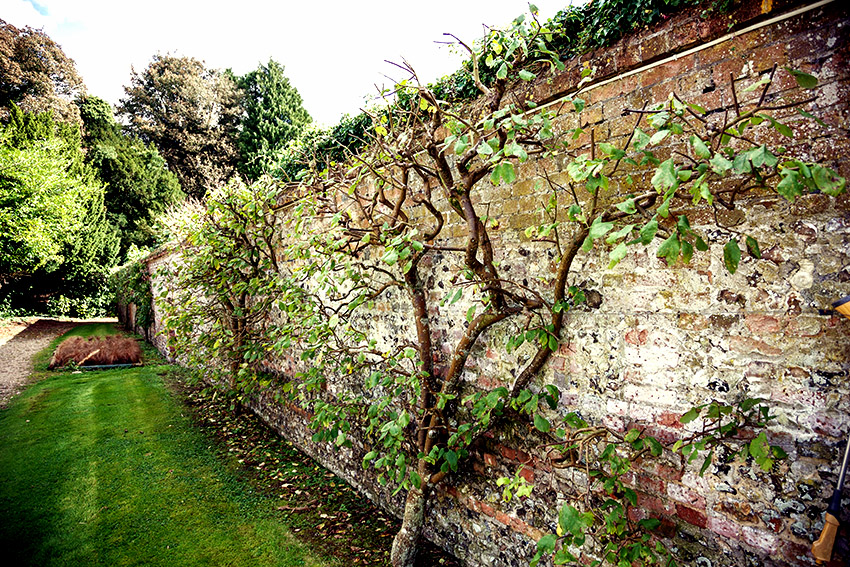 In today’s world, most of the traditional “downstairs” roles have changed and evolved into careers and jobs. The concept of “stewardship” however has never been more important but is now primarily connected to the owners of such properties. It is the core responsibility of Geordie and myself: our role at Highclere is that we are simply looking after the Castle and its landscape during our lifetime, working to understand, serve and share.
In today’s world, most of the traditional “downstairs” roles have changed and evolved into careers and jobs. The concept of “stewardship” however has never been more important but is now primarily connected to the owners of such properties. It is the core responsibility of Geordie and myself: our role at Highclere is that we are simply looking after the Castle and its landscape during our lifetime, working to understand, serve and share.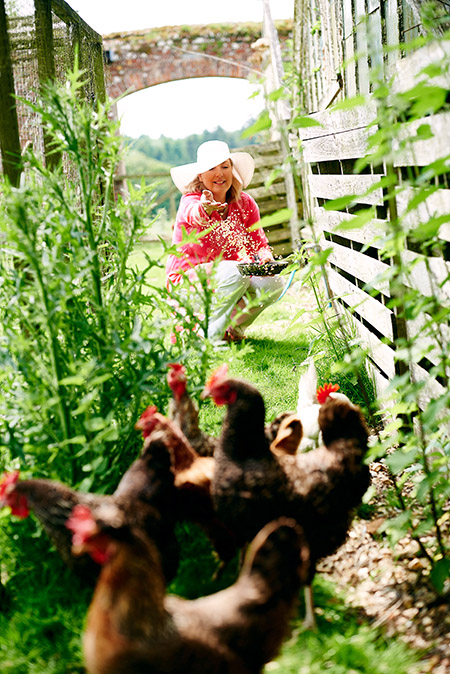 The castle itself is just one part of this stewardship. The wider estate includes ornamental gardens, orchards, vegetable gardens, fields, farms, woodlands and downland. In our time, we have re-planted gardens to grow vegetables, fruit and vines, put in new specimen trees and planted copses. The fields which we farm have records going back 500 years.
The castle itself is just one part of this stewardship. The wider estate includes ornamental gardens, orchards, vegetable gardens, fields, farms, woodlands and downland. In our time, we have re-planted gardens to grow vegetables, fruit and vines, put in new specimen trees and planted copses. The fields which we farm have records going back 500 years.
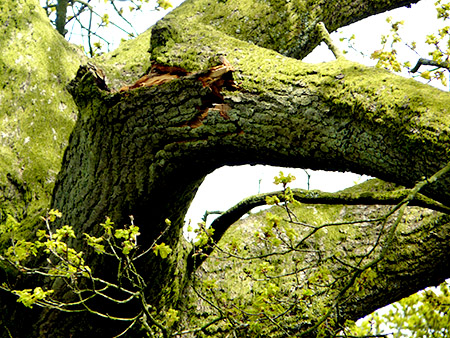 We grow food and farm sheep whilst leaving space for beetles, birds and wildlife, trees to decompose as they fall, rough areas for small wildlife, field margins, wildflower borders and stubble for endangered birds such as curlews. It is a landscape of time and space and our role is to tread lightly. The sheep graze the downlands, our pigs live in outside fields and we put down feed for the wild birds through the winter.
We grow food and farm sheep whilst leaving space for beetles, birds and wildlife, trees to decompose as they fall, rough areas for small wildlife, field margins, wildflower borders and stubble for endangered birds such as curlews. It is a landscape of time and space and our role is to tread lightly. The sheep graze the downlands, our pigs live in outside fields and we put down feed for the wild birds through the winter.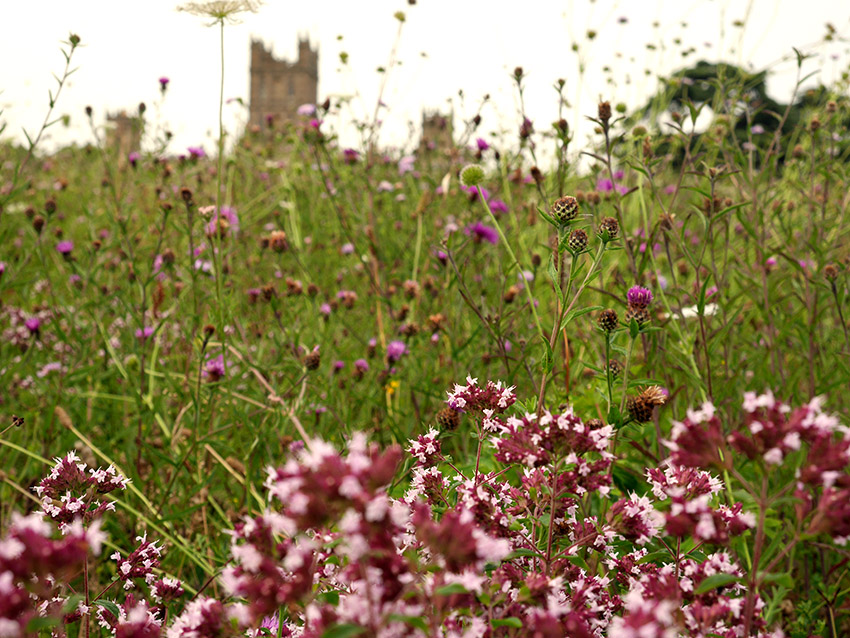 Some of what we have done has been created and supported by various Stewardship schemes over the past decades and I think they have worked well and should be augmented. The wild flowers, wild bird support, beetles, downland and chalkland conservation are invaluable to the preservation of the landscape and nature.
Some of what we have done has been created and supported by various Stewardship schemes over the past decades and I think they have worked well and should be augmented. The wild flowers, wild bird support, beetles, downland and chalkland conservation are invaluable to the preservation of the landscape and nature.
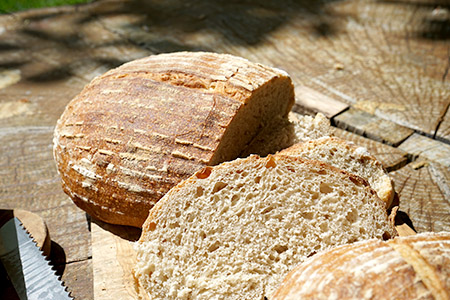 There is a growing understanding and impetus towards conservation and preservation in most countries now but we are still at war with ourselves over the cost of such things versus cheap food and consumerism. Our predecessors had fewer choices and, somewhat ironically, were therefore much “greener”. They grew food and cooked it rather than manufacturing and packaging it. Whether we are carnivorous, vegetarian or vegan, it is our “addiction” to modern food processing which is a large part of the issue. The refusal to eat misshapen vegetables, the insistence on food out of season and the miles travelled for global choices to be available is, in many ways, the heart of the problem.
There is a growing understanding and impetus towards conservation and preservation in most countries now but we are still at war with ourselves over the cost of such things versus cheap food and consumerism. Our predecessors had fewer choices and, somewhat ironically, were therefore much “greener”. They grew food and cooked it rather than manufacturing and packaging it. Whether we are carnivorous, vegetarian or vegan, it is our “addiction” to modern food processing which is a large part of the issue. The refusal to eat misshapen vegetables, the insistence on food out of season and the miles travelled for global choices to be available is, in many ways, the heart of the problem.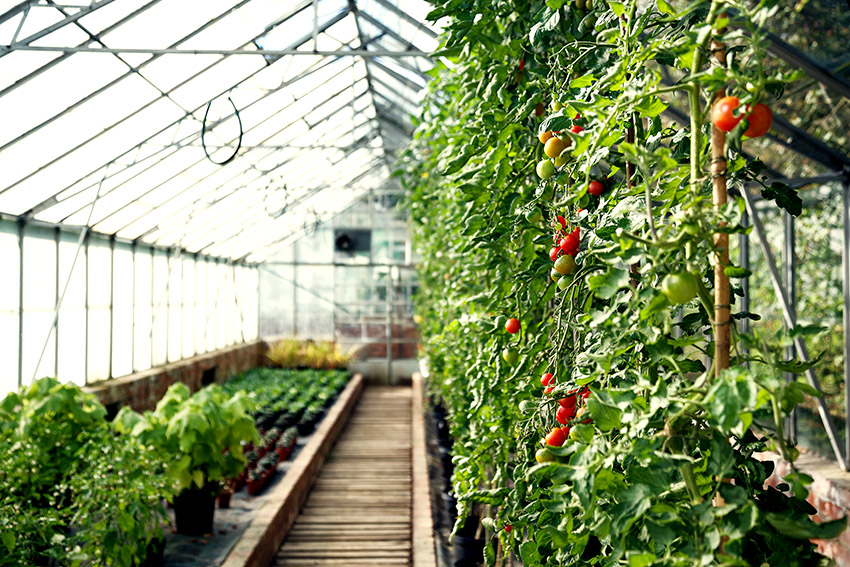 This weekend I found myself watching the Netflix film “Don’t look up” which is a parody but nevertheless a little too close to home for comfort. Our never ending “need” for finite natural resources, our ever-expanding populations and the understandable desire in each of us to have what everyone else has, fostered by nonstop advertising campaigns, is fundamentally incompatible with our growing knowledge of the damage we are causing.
This weekend I found myself watching the Netflix film “Don’t look up” which is a parody but nevertheless a little too close to home for comfort. Our never ending “need” for finite natural resources, our ever-expanding populations and the understandable desire in each of us to have what everyone else has, fostered by nonstop advertising campaigns, is fundamentally incompatible with our growing knowledge of the damage we are causing.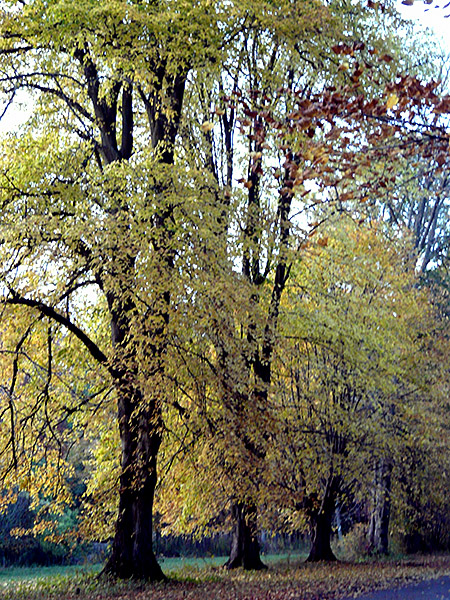 Back here at Highclere we do our best to balance the practicalities and realities of life with the desire to pass on this magical world in the best condition that we can. We try to grow food in a way that also offers space and deference to those we share this world with and to “steward” it safely into the future.
This summer, when the weather improves and the landscape comes into its own green splendour, I thought it might be interesting organise some tours exploring the wider landscape here, looking at the beauty of the plants and trees and the ancient views of fields, downland and barrow. Watch this space!
Back here at Highclere we do our best to balance the practicalities and realities of life with the desire to pass on this magical world in the best condition that we can. We try to grow food in a way that also offers space and deference to those we share this world with and to “steward” it safely into the future.
This summer, when the weather improves and the landscape comes into its own green splendour, I thought it might be interesting organise some tours exploring the wider landscape here, looking at the beauty of the plants and trees and the ancient views of fields, downland and barrow. Watch this space!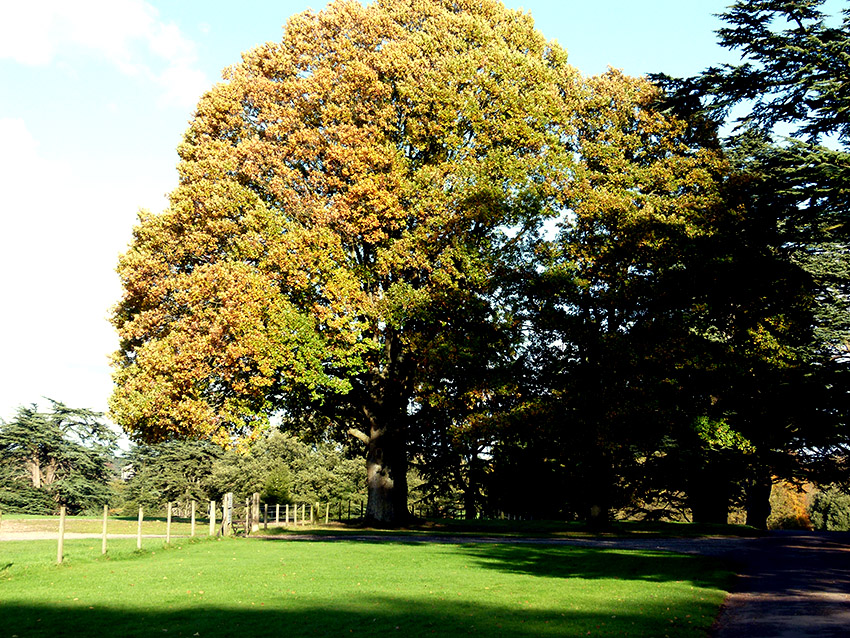
58 Comments
Amazing!
I’m from California, the state is very supportive of environmental ways to save the planet, so I’m intrigued that you’re beginning to share our concerns. Even though our climates are totally different, it’s about changing consciousness in the end, which the movie try’s to do. Bravo
I was talking to someone today who said he thought we had been allowing areas to rewild and also farming for the last 10 years - we just had a different vocabulary
Hi Cheryl I totally agree I'm Stuart hudson from Dalby Queensland Australia Lady Carnarvon and Lord Carnarvon are doing a great job of preserving the house and the Enviroment around it for future Generations to admire and Enjoy!!!! Unfortunately our family Lost mums old Family Victorian home!!! "WILL-Marr" built in 1865 I only have 1 uncle left on 5acres in Jandoeae ,Queensland my Dream is one Day to get the home and Victorian Gardens Recreated in period style with all my Victorian period furniture!!!! To pay homage to my Great Grandparents William "Bill" and Margaret -"Marr" if one doesn't know their past one doesn't really know their future lol!!! Future ideas would be to set up a Victorian style B&B with an old style Barn for Fulton's and Victorian veggie gardens and flowers,Roses things may not go to plan but my late Grandfather always says Dont Abandon one's Dreams for those that lack visuon!!!! Cheers regards from Stewy Hudson and Family Dalby Queensland Australia xxxxxxx I
thank you
Lady Carnarvon, Thank you for sharing & caring. Have a lovely week, Barbara B.
Good Morning!
What beautiful pictures. I especially like you with your chickens.
Your message is so important. I agree, tread lightly.
Have a wonderful week.
Shelley in Virginia
What a lovely tribute to the past and a wonderful plan for the future.
Marsha in Mississippi
Dear Lady Carnarvon,
It warms my heart to know how passionate you are about Conservation, & how much you are doing to preserve & protect your beautiful part of this Planet - I WISH there were many more people like you to love & protect our Earth.....
I have also seen "Don't Look Up" & it certainly made me think.....is there ANY end to mans' greed?!!
Thanku for you wise words & fabulous photographs, have a safe & happy Winter,
Yours,
Caroline
How kind thank you
MY DARLING LADY FIONA,
GOOD AFTERNOON , RAINNY DAY, 26 ° CELSIUS ,10H25M
I WOULD LIKE TO KNOW THE LAKE NEAR THE TEMPLE OF DIANA, THE OLD BRIDGES AND IF THERE IS NATIVE FOREST, IN VIDEO.
VILLA ALEMÃ
RIO CLARO - SP
BRAZIL
PS LOVELY PHOTOS.
Hello , Thankyou for the wonderful insight into your wonderful castle and the stewardship it’s amazing how much knowledge you share with us and so interesting to understand how everything works at Highclare and how hard you work to keep everything Green .I really do look forward to your blogs Thankyou
Thank you!
Why shouting? No need to write all in capitals, it is quite aggressive to the eye!
I don't know about the bridges or the Diana Temple, but surely Highclere Castle has native forest. (If you go to "Highclere Castle" on Facebook there is a post about the temple you ask)
If you are interested in knowing about the estate you can read in their website, example: "The first written records of the estate date back to 749 when an Anglo-Saxon King granted the estate to the Bishops of Winchester.", so there is your answer. The place has been there since the 8th centure, native trees will be 1273 years old or less.
You can also go to their online shop where you can find books about the place.
Just explore the website and follow the links, really, there is so much. Podcasts, videos, etc.
The present Countess is doing a fantastic job with all the media and communication, you just have to explore the website a bit.
Great Britain has been, since the Ice Age, a big tree plot. You can look in the internet for organizations that dedicate themselves exclusively to all things forest and trees.
Here for all things woodland:
https://www.woodlandtrust.org.uk/trees-woods-and-wildlife/british-trees/native-trees/
I hope this helped a bit.
Ana Thank you - the book "Seasons at Highclere" looks at what we can do, it is a book looking at climate change but in a reflective poetic and hopeful manner. I enjoy writing but I suppose I feel this book has a lot to give..
It is in my book Seasons at Highclere
Hi, I too live in Brazil and am quite sure Professora Maria Augusta Pinheiro did not mean to shout at Lady Carnarvon. Rather she expressed an enthusiasm found in the Brazilian culture and, by way of a compliment, felt inspired to ask for more details. Her command of English is perhaps not on a native level, but nevertheless well meant.
I too loved the post, as always, and am grateful for all the work Lady "Fiona" - or Carnarvon - puts into it.
Thank you and keep writing.
Siri Chateaubriand, Rio de Janeiro
I wish I spoke Portugese as well as her English !
THANK YOU VERY MUCH FOR YOURS WORDS, MISTER CHATEAUBRIAND.
Thankyou for sharing, and look forward to hearing aboiyt your new yours. Good Luck.
Please continue your stewardship...thoughts on future tours would be wonderful.....Photos are appreciated.
This was a lovely article, and so true. I would love to be guided through your gardens someday.
I hope you have good health and happiness in the new year to continue your labors of love.
Watch this space!
Just beauiful. Thank you, I have the after holiday blues. You're e-mail make my day.
fondly Jenny
Thank you!
Dear Lady Carnarvon,
I couldn’t agree more… we must protect and enrich our world rather than stress and destroy it. The needs of humanity must be addressed in non-destructive ways whilst looking after the underserved and protecting the natural order. Kindness versus cruelty.
Your photos capture the broad range of your work, and well done! When the world comes right again I should love to return to Highclere and take a tour of the broader woodlands and fields. Sounds like great interest and great fun! I know you keep bees… how are they managing these days?
Thank you for another beautiful blog. Stay well!
Best regards,
Charlotte Merriam Cole
I look forward to greeting you at Highclere!
A simply marvellous read Lady Carnarvon. Meaningful and inspiring for these times as well as acknowledging the life lessons learned from earlier times. May your own stewardship times flourish and give continuing and new life to all your house, home, gardens ,land and wildlife. You are doing a terrific job!
Best wishes
A tour through the landscape and gardens would be fabulous! An opportunity to learn a lot more about the conservation that you do around the entire area. Thank you for highlighting that consumerism needs a re-think.
Dear Lady Carnarvon
I have always tried that the Butler made sure everything worked and was the most powerful role among the household staff. Was the House Steward more powerful, or did they do different things, so they could have the same ranking?
I have read that the housekeeper could be a woman with a high ranking and if it was high enough could she eat with the Family. I am not sure about the source, so I wonder if this is true and how often occurred it. If it is true, don't they have their own household to manage?
I think it's very interesting with service people and peerage, and I hope we will see more about it in the future. :)
With kindest regards
Vilgot Grindberg
In order of rank it was House Steward, Butler, under Butler and then the Footmen
Dear Lady Carnarvon,
I think it is wonderful that the estate is being run in as much a sustainable way as possible. I miss my chickens (fox got them a few years back and we haven't had the confidence to start again)but love eating our own apples, making apple pies, cherry pies etc. When I retire, I may try making a cherry liqueur. A tour of the landscape sounds amazing, I will most definitely book up for that! Roll on the summer....
Kind regards,
Jane Bentley
Roll on the warmer months!
From Salt Lake City, thank you for your inspiring post. Your passion for making wise choices to support our fragile ecosystem and your appreciation for the natural wonders around us is evident. You have motivated me to make better choices. I love being outdoors learning as much as I can about the world around me and I hope to one day visit Highclere.
What a wonderful post! One thing you said that I found most thought provoking is “the insistence on food out of season and the miles travelled for global choices to be available is, in many ways, the heart of the problem.” Wow! We are so self centered and because of our ‘need’ for instant gratification we, meaning our world, are suffering for it. Oh to lead the simple life and be content with what we have!
Thank you, Lady Carnarvon, for this post today.
Thank you Terry
Good Morning, Lady Carnarvon! As always, your writing and photos engage, inform and inspire each week. I so look forward to your posts, and now I will look forward to your plan for tours of the wider landscape of Highclere. Brilliant!
Watch this space!
I enjoyed reading your blog today, especially because I read your book about Almina. I loved the book so much I gave it to friends as a Christmas gift.
I can see the dedication and devotion that goes into your stewardship. Anyone who thinks you toddle around the castle draped in jewels needs to see your schedule.
Thank you for your inspiring blogs,
Lise Beane, Cape Cod and Florida
Thank you!
Dear Lady Carnarvon,
Happy New Year, and greetings from Southern California! Thank you for your blog. Coming from the land of abrasive talking heads (news pundits) and extreme everything, your gentle words, descriptions and photos offer a lovely respite.
As a longtime fan/student of Austin’s Pride & Prejudice, your description of “steward” is instructive. I now better understand Caroline Bingley’s comment to Elizabeth Bennett about her crush, George Wickham: “… he was the son of old Wickham, the late Mr. Darcy's steward.” I never really knew what a steward was - you fixed that! Wonderful.
All the best to you and yours in 2022. And PS a tour of the gardens at Highclere would be an absolute delight. I would absolutely make a pilgrimage there for that.
Cheers,
Elaine Boyd
Thinking cap is definitely on!
What a lovely article! I hope to visit one day and a tour of the whole estate and the opportunity to receive some education about its care would be amazing. Thank you for beings such great stewards!!!
What a wonderful idea to provide tours of the landscape and grounds of Highclerc I think writing another book on this topic would be helpful. Really enjoyed the photos especially of the greenhouse, another part of the tour people would be interested in.
Your words describe my belief about how we have become a society of ‘I want what I want when I want it’. As a Senior … living in rural Ontario, Canada … I grew up with strawberries in June, wild blueberries in August, peas & beans in July & August, etc. Apples in the Autumn. Oranges were a special treat at Christmas.
I’ve always felt it ‘wrong’ to eat fresh strawberries in December …
I belong to an Eat Local Cooperative … and purchase the majority of my produce, meat and fish from them. It is a joy to know where our food actually comes from.
I applaud your love for your land.
Daphne
Season at Highclere ! That is my version of a book about climate change
Lady Carnarvon:
I so look forward to your posts every Monday morning...they always brighten my day and give me pause for thought...This post, especially, is near and dear to my heart.
This grandmother worries that her grandchildren may never know such wonder as an unspoiled area by man...
Thank you, Lady Carnarvon, for your dedication to conservation!
Be Blessed,
Jewell
North Carolina
USA
You are someone after my own heart! I would love to explore the land around Highclere wearing my hiking shoes and with my binoculars around my neck. Your idea of an outdoor tour sounds very appealing, rain or shine. Count me in!
Dear Lady Carnarvon. I was most interested in what you say about stewardship, as here, on the Welsh borders, we have many ancient and beautiful churches, the care of which falls to the dwindling (and elderly) congregations .... we have to be stewards of our churches, which in the not too distant past, were kept up and maintained/paid for by 'the gentry' (as Downtons Dowager Lady Grantham pointed out to the vicar when he had doubts about performing Williams marriage). If we don't work to look after our churches, then they will be de-concecrated, and close, before being sold, and that will be that. Another potential holiday home, perhaps, or a carpet warehouse !!
I am giving a talk in local church here (in Burghclere) to raise money for it and bring in a few people I hope... I think they matter
Lady Carnarvon lovely pictures of Stewards ship and lord Carnarvon have a nice weekend and thank you for send me your email
I was lovely to visit highcelere castle
Thank you for the interesting article. I love to receive your updates via email and read your perspective on the estate. Wishing you all the best in 2022 and looking forward to visiting in the near future!
Julia, Washington, DC
I look forward to greeting you soon!
Lady Carnavon, Strange as it may sound the American Indian believed that they didn't own the land but were just keeper's of it.
My wife and I enjoy Downton Abbey and love the views of the Abbey.
I saw an amazing exhibition in Omaha - People of the Interiors - and often link that in my talks - agreed
Lady Carnarvon,
Your and Lord Carnarvon’s stewardship is certainly full-time; I know you must wake up occasionally wondering if there will be a time for a vacation! However, I am proud to be among the huge group that enters the world of Highclere Castle, inside and out, through actual visits - which I’m glad to say I’ve done - your excellent writings, and continual campaigns for our world. Thank you very much for your constant efforts. What you and Lord Carnarvon do every day is so important for your country and efforts throughout the world. May we adopt stewardship of resources in our own worlds.
Martha G
Every little helps our world for future generations
The best post yet.
Thank you!
I'm new to your messages, found this after finishing my Lady Almina book (just ordered the second). How lovely you take the time to make these Monday posts, Thank You, it's a wonderful way to begin my own busy stewardship of a very old (by American standards) farm in Kansas. I will in the future make a point of the trip to see the grounds and, hopefully something of the native birds there, which I'm guessing find your space a welcome refuge.
Happy New Year to you!
(Ps, just ordered the second book!)
Sincerely,
Carolyn in Kansasland :)
Thank you Catherine is also a fun book!
Dear Lady Carnarvon
I write from Italy, Tuscany.
I joined your blog recently e I wish to thank you very much for the beatiful stories and the beatiful places you share.
Stewardship...what an interesting concept. Really, that's all any of us are...stewards of God's blessings that he's apportioned us. A tour of your fabulous home and gardens is a wonderful plan and I always enjoy your writings.
Thank you
I have been fortunate to walk the grounds, photograph the foliage and enjoy the peace and serenity at Highclere. I did have many questions as to what certain things were and the history behind them. I for one would love a tour as you have mentioned!
By the way, I highly recommend a visit to Highclere for all at different times of the year, as its splendor changes throughout the seasons.
Lady Carnarvon,
I do so enjoy your Monday postings and especially today as we are buried in snow here in Upstate NY. I am curious if the next generation is also as keen on the preservation and conservation of Highclere?
Many Blessings,
Minnie
Thank you again for your insight. One of the things I really wanted to do when I visited with a private tour from the US in May of 2016, was walk the grounds. However, it was pouring down rain, and, even though I, as one who hikes in the western mountains of the US will go outside in all kinds of weather, the group as a whole, had no real interest in getting drenched, so after the inside tour and gift shop (opened especially for us, thank you) our director deemed it unnecessary to linger so the grounds will have to wait for a return visit. The idea of a grounds tour where the conservation of the grounds is explained is a wonderful idea and, if I am ever lucky enough to come again, I would jump at the chance to do it.
Hope you will!
I am lucky to live in a city that promotes recycling. A happy week for me in one in which I only put out one small bag of trash. Still there are things that are not recyclable including black plastic. However, I have found many uses for this product including using the trays and bowls at my school. The trays are perfect for small school supplies and the bowls can be used for water and paint for art projects. I belong to Lions Club. Our main service focus has been sight preservation. Recently we received a donation of 118,000 pairs of used eyeglasses. These are being sorted and cleaned. Then using a lensometer, the prescription(s) can be determined. These glasses will be shipped and used worldwide. However, those glasses come with 118,000 eye glass cases. The cloth ones are recyclable but the hard "snap" cases are being made into small hygiene kits and pencil cases. Not only do we need to follow more sustainable practices when growing our food, we also need to develop more "nature friendly" practices when discarding our trash. Our oceans are full of plastic, our landfills are full of items that can be recycled. Convenience comes with a price and the Earth pays the price of that.
Thank you for such an important message, we all may not have a castle or an estate but we all need to look at our life and see how we can leave this place better for the next generations. I'm retired but I have a farm and horse stable, also chickens, dogs and cats. I feel overwhelmed at times because it's just me. I can only imagine what it must like to be trusted with so much.
I hope to give my farm to my neices and nephews since I never had children but I have to keep it a place they would be proud to live, all while keeping things natural, protecting the local bees, wild life and giving my critters a long quality of life. There are many ups and downs but I've realized I'm so lucky to have this work and life mission. We all are, regardless of our situation.
My spent 23 years as a helicopter pilot in the US military and another 20 owning and running a large commercial horse barn and animal rescue. I've loved it all but never had the time to really look back and appreciate it all. My personal horses are all in their mid 20s now and it's been hard to see them age. My girlfriend tells me my horses are probably thinking the same thing about me. Haha. None of us are getting out of here alive so we better it enjoy it and work hard to leave something special to the younger generations.
Kudos to you for doing all that you do with a smile, making it all look so easy. I watched the Downton Abbey movie this past weekend and it's like seeing my long lost family again. I so miss seeing it every week. And Highclere is lovely. I really hope to get back to the UK before I die, maybe at Christmas because London looks amazing with all the lights. I'd love to see the countryside of Yorkshire, the coast to look for Poldark (lol) and of course, Highclere.
Cheers, Celeita from Tennessee (USA)
Thank you very much for your insights. It sounds as if you should write a book too
Another award winning post Lady Carnarvon! Also agree with many of the comments posted prior to mine. We do need to find ways to preserve the past respect and appreciation of our world as previous generations did as many of us around the world have lost hold of all that and just keep layering concrete throughout the lands. Agree about a concern for generations going forward. You could become Conservationist and Stewardship Leader of the World given yours and Lord Carnarvons understanding and appreciation of that responsibility of Highclere and the lands and nature surrounding it! Well done and congratulations on all you've accomplished over these years. Continue to remain well and look forward to another visit!
We are a mini microcosm!!! We all have to try..
As I sit here at home watching the UK version of Downton Abbey...again, I love to hear how you are taking care of and sharing the stewardship of your beautiful home, Highclere Castle. I am sure future generations will appreciate and thank you for what you do.
KRISTINE LILJA-KING
Bangor, Maine USA
Thank you and the Earl for your continuous stewardship of Highclere and reminding us that everyone can contribute something to help Mother Earth. I’m a senior living in an apartment, but I get great joy from recycling, and taking my little compost bag to the green bin each Thursday. I recorded the Downton Abby movie and watch it often, recalling my one visit and looking forward to another, hopefully this year.
Best wishes as you do all the tremendous work it takes to preserve your home and lands for the enjoyment and benefit of so many.
Gratefully,
Sharon
Novato, CA
Thank you !
Lady Carnarvon,
I would love to see an online "Highclere stewardship walking tour" of what you have done and plan to do. God gave us the responsibility as caretakers of our space, and I would be encouraged to see what you have going on.
Good morning from me again, I am always out of sync with most of our chatters time wise and season wise but it is good to compare what is going on "down under" with the northern hemisphere.
I totally agree that we are the stewards of nature and to that end I try to do my bit. I waste no vegetable peelings, they are composted together with torn up newspapers and even the dust from my vacuum cleaner! By using composted soil on my gardens I rarely see a bug of any kind and as for buying fertilizer.........forget it !! I buy any fruit or vegetables that I don't grow at a shop which sells mis-shapen produce and I have found out that a carrot shaped like a corkscrew tastes exactly the same as a "perfect" one.....amazing eh? I buy nothing in plastic choosing to drive 1 kilometre further than the supermarket once every few months to purchase bulk products like flour, sugar etc. and I take my own containers so they can be used many times. I use plain old vinegar mixed with bi-carbonate of soda which is a good all purpose cleaner.
We owe the land a debt and it is up to us to leave it in a better condition than we found it. It is not difficult to plant a tree or grow your own produce wherever possible, keep chickens and practice good recycling husbandry..........it just takes a little thought and effort and the results are amazing. Throw out all those cleaning products containing harmful ingredients and you will soon see how companies are charging us a fortune to poison our world. I think we should all investigate how we can help the environment, roll up our sleeves and go for it !!!!
I applaud you Lady Carnarvon and your stewardship of Highclere shows in the photographs you post. You live in beautiful surroundings and the pride you have in Highclere really shows.
I hope you and Lord Carnarvon are well
Best wishes
Joy in Australia
In the UK we throw away 30% of the food we buy ....
I don’t know how you do this every week Lady Carnarvon. I love learning new things especially about your world. Very interesting. I had to look up a few things like ‘copious’ and ‘augmented’ to truly understand your meaning.
I will buy your book next “ Seasons at Highclere” as we are all Steward’s of this world. I’d be interested how and what we can do, as climate change and food from all over the globe is available and out of season.
I especially want to thank Elaine Boyd for her reply. Very interesting. Happy New Year everyone!
thank you
Dear Lady Carnarvon
I hope all is well.
An eco tour of the grounds as well as the castle would be amazing.
I happen to be reading P&P these holidays and shall search for the reference to the steward - thank you.
Kind regards
Susan Marie
As caretakers of the castle you have enormous tasks. Kudos to you and your family.
As always you educate. We're not aware of the existence of a Steward and the role he played. Is that similar to Carson's role on Dowton Abbey?
Blessings,
Phyllis Simpson
Yes - even more superior !!!!
A great insight into life and times at Highclere. The idea of tours around the 'farm' seeing the landscape is a wonderful one! Hope to be there one day!
A wonderful idea to expand tours to include some of the more far-reaching corners of your grounds, Lady Carnarvon. I would find this almost as interesting as a tour of the Castle itself.
Excellent article.
Really kind!
It would be fantastic to take a tour of Highclere's "wilderness", with fields of wildflowers and weeds, where bees and bugs and butterflies are free from chemical sprays. Also guided tours through wild woodlands would be fabulous too. You are both excellent stewards of the land and the castle, what a fine legacy you are creating for future generations.
Thank you
A beautiful and vital reflection. Especially love all the photos. Thank you!
Hello Lady Carnarvon, excellent description of Stewardship. We love nature as well, birds and bees, flowers and trees. Nature always has wise lessons if we just watch and listen. Especially your ancient trees, they are absolutely amazing.
We watched "Don't Look Up" as well last weekend.
Take care and stay safe. We do enjoy your blogs and photos so very much.
David and Sandy in Oklahoma, USA
You are very kind
We are hoping to visit Highclere Castle around Sept 4 or 5, at the end of a cruise. We do hope that it will be open for visitors at that time. A tour of the fields, gardens and wild areas would be very enlightening! Hoping you will plan such adventures there!
We are open to the public on 4th & 5th September - I would suggest you reserve the tickets as it gets very busy!
Dear Lady Carnarvon,
Thank you for another very interesting blog this week. I look forward to reading your posts each week which are always so articulate and engaging. I’ve learned a lot from you recently!
Looking forward to visiting Highclere again later this year.
Kim Daniels
West Midlands.
I look forward to greeting you soon!
I very much enjoy your writing and agree with you as to what we should all be doing to help save what we have.
I do have a question, who takes the photos that accompany your words? They are very beautiful.
Dear Lady Carnarvon,
It was my wife's birthday last Sunday, January 9, and I thought that a visit to Highclere would be a wonderful present. What a treat we had. When we drove into the grounds we entered a truly magical kingdom, graced by a bright winter sun that picked out the stunning grounds enhanced by Capability Brown. Our first view of the Castle was like meeting a very famous film star. We were equally impressed by your speech that made us all feel so welcome and not just gawping tourists, although we did gawp when we saw your stunning galleried reception room. WOW! The tour was excellent and it was great to relive many iconic moments from Downton. The Egyptian exhibition in the cellars is very informative and conveys some of the emotion Lord Carnarvon and Carter must've felt when they first set eyes on the amazing golden treasures. Our next great treat was the tea. The way it is presented is exceptional and it tasted as delicious as it looked. Lastly, your gift shop is full of interesting items and fairly priced. My wife bought a beautiful, floral, Maxwell & Williams milk jug. The sun was setting as we drove through the estate's rolling farmland taking away with us copies of your latest book, Seasons At Highclere, and unforgettable memories. Thank you for helping me give my wife a very special day.
I am so please you enjoyed your special day at Highclere Castle
I visited this special place on the 13th of January for my birthday. My partner of 10 years got down on one knee in the front of the house- what a special special day!
Congratulations!
Aloha Lady Carnarvon,
Thank you for sharing the authentic essence of stewardship! We too, here in Hawaii are conveying a message of conserve, kokua (assist) and malama ʻaina (nurture) our land and natural resources to all those who dwell and visit our Islands.
Those who came before us were very much in tune with the importance of the balance and cycle in all resources.
Mahalo for sharing your beautiful grace, knowledge(manaʻo) and respect for all that came before you.
Your Aloha (love) of this Special Place is exemplified by all you do!
Thank you
Excellent write up.. so very true. We are growing more of our own food and being very aware of the miles for other foods and even flowers at the market. We can be the change!!
Dear Lady Carnarvon:
I apologize for the delay on responding, but time has slipped away from me.
Today is the first opportunity I have had to read this particular Monday's blog.
Enjoyed learning the history of stewardship and how it applies to the day-to-day operations of the Castle. As always, great pictures accompany the story.
Also, thank you for the gentle reminder to try to change our ways as it applies to daily living.
Until next week, all the best to you.
Perpetua Crawford
Leave a Comment

- Christmas
- Community
- Dogs & Horses
- Egypt & Tutankhamun
- Entertaining
- Farm
- Filming
- Gardens
- History & Heritage
- Daily Life
- Royalty
- Cooking
- Interiors
- Heroes
- Architecture
- Cars
- Conservation
- Downton Abbey
- Events
- Gardens & Landscape
- Highclere Castle Gin
- History
- Planes
- Restoration
- Stories & Books
- Uncategorized
- Visitors
- Wildlife





Lady Carnarvon, your story today could not get any better. Perfect! Cheryl.
Right on point…thank you!
This was a wonderful story on taking care of what we have!! And soo true! Thank you. Kathy Moore USA!
Tutto ciò è magnifico ed auspicabile. È così che dovremmo procedere, tutti, per assicurare un futuro al nostro mondo